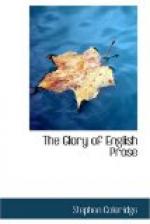“Old secrets come to
view; and long-buried despair finds voice.
Read this portion of an old
letter.
“’If for my consolation Monseigneur would grant me, for the sake of God and the Most Blessed Trinity, that I could have news of my dear wife; were it only her name on a card, to show that she is alive! It were the greatest consolation I could receive; and I should for ever bless the greatness of Monseigneur.’
“Poor prisoner, who namest thyself Queret-Demery, and hast no other history,—she is dead, that dear wife of thine, and thou art dead! Tis fifty years since thy breaking heart put this question; to be heard now first, and long heard, in the hearts of men.”
In the reign of Louis XV. alone, there were no less than fifteen thousand lettres de cachet issued, by which anyone could be suddenly arrested, and, without trial, and, heedless of protest, imprisoned perhaps for life in the Bastille.
In the excesses of the Reign of Terror three or four thousand persons perished. Their deaths were spectacular, and have covered with execrations their dreadful executioners.
But it is right that we should remember, Antony, the life-long agony and the unutterable despair of the victims of that remorselessly cruel system which the Revolution overthrew.
The chapter on the “Everlasting Yea,” in Sartor Resartus, seems to me to come nearer to the above excerpts than anything else in Carlyle, though at a perceptible distance:—
“O thou that pinest in the imprisonment of the Actual, and criest bitterly to the gods for a kingdom wherein to rule and create, know this of a truth: the thing thou seekest is already with thee, ‘here or nowhere,’ couldst thou only see!
“But it is with man’s Soul as it was with Nature: the beginning of Creation is—Light. Till the eye have vision the whole members are in bonds. Divine moment, when over the tempest-tossed Soul, as once over the wild-weltering Chaos, it is spoken: ’Let there be Light!’ Even to the greatest that has felt such moment is it not miraculous and God-announcing; even as, under simpler figures, to the simplest and least. The mad primeval Discord is hushed; the rudely-jumbled conflicting elements bind themselves into separate Firmaments: deep, silent rock-foundations are built beneath, and the skyey vault, with its everlasting Luminaries, above; instead of a dark, wasteful Chaos, we have a blooming, fertile, heaven-encompassed World.
“I, too, could now say to myself: ’Be no longer a Chaos, but a World, or even Worldkin. Produce! Produce! Were it but the pitifullest infinitesimal fraction of a Product, produce it, in God’s name! ’Tis the utmost thou hast in thee; out with it then. Up, up! Whatsoever thy hand findeth to do, do it with thy whole might. Work while it is called to-day; for the night cometh wherein no man can work.’”
There is another passage in Sartor Resartus which I have always held in veneration, though the field labourer is not now so “hardly-entreated” as when Carlyle wrote of him:—




